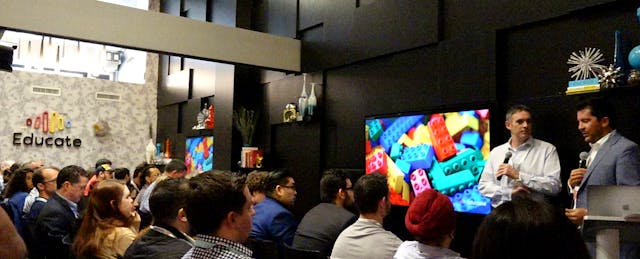Learnosity’s Educate Developers event in New York City stands out from many bigshot edtech conferences. For starters, it’s small and hosts an intimate 150 people—among the crowd was also a noticeable lack of students, teachers or administrators—the function is designed specifically by developers for developers. The “techie” nature of the day was underscored by Learnosity’s co-founders Gavin Cooney and Mark Lynch, who showcased their nerd pride with an announcement to kick off the event: “This is Star Wars Day.”
Started in 2007, Learnosity creates online education assessment and teaching software. The company boasts millions of active users but keeps a low profile in the edtech industry because it, like many of the other developers at Educate, are the middlemen who create tools for other developers who want to create education technology products.
“There are talented developers across this industry, but they’re often reinventing the wheels, and you are wasting your time doing that,” Cooney explains. “It seems really simple to make a multiple choice questionnaire, but it is actually really difficult.”
According to Cooney, in order for individuals in the edtech industry to develop more effectively, they should spend 30 percent of their time on product development and 70 percent of their time with users. But because many in the edtech field try to do both (with limited funds), they often don’t do either thing well.

His ideas are supported by other developers. According to Forbes guest columnist, Sumit Mehra, new developers often significantly underestimate the cost and time that it takes to develop a new app or technological product—noting that a high-quality app could take a team of six more than half a year and nearly millions of dollars to create. This expense in time and money is something that Cooney and Lynch hope their company together with their newly created edtech developer partner network can solve.
“We didn't want to do all things for all people, we didn't want to do a bunch of things ok, we wanted to do one thing and do it extraordinarily well,” explains Cooney, noting how building a network of developers who each specialize in creating tool pieces for other developers can lead to more efficiency in the long run. Some of the larger developers are sold on the idea, and companies such as GeoGebra, Aveniros, and Desmos have joined Learnosity’s Partner Network.
However, with options like open-source code on the table, other developers say Learnosity’s network might be more expensive and time-consuming than it sounds.
Kerri Lemoie has been developing edtech products for almost 20 years and notes that developers should have a clear vision for an end product in mind before spending any money on tools. “It depends on your business requirements,” says Lemoie in an interview with EdSurge. “Lots of times you cannot buy software and change it, it is against the licensing to do that, but if you get open-source code, you can do what you want.”
Lemoie agrees that whether paid or open-source, there is no point for a developer to build something from scratch. “Good programmers are lazy; you don’t need to write new code, you go in and use what’s there, that is why we have the open source community,” she continued.
So how does one know whether they should work with a particular developer?
Deval Clearwater, vice president of partner integration from Houghton Mifflin Harcourt, says her company is always looking for partnerships to stay innovative. “In order for us to stay competitive in the marketplace we sometimes don’t have the time to build everything ourselves so we look for organizations that offer specific services,” explains Clearwater. “Our development teams list out features and functionality they need, and I find the companies.”
Clearwater recommends that developers create a process that helps them understand which partners they want to use to build their products. “You should understand the longevity of the organization, what level of support is available and if it is a good fit with the model you have,” says Clearwater. “One of the things we look for if it is a relatively new company is to understand what that company’s impact will be to our product offering in the event they disappear before the product lifecycle, based on that, we may invoke an escrow requirement as part of the contract.”
She suggests that novice developers bring in experts before investing in tools. “Technology teams can ask the right questions, like what code is it? What is your authentication? What is your privacy policy,” explains Clearwater. “It is not a one and done; it is a process.”


